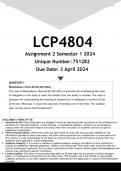LCP4804
Assignment 2 Semester 1 2024
Unique Number: 751282
Due Date: 3 April 2024
QUESTION 1
Motsoatsoa v Roro All SA 324 (GSJ)
The case of Motsoatsoa v Roro All SA 324 (GSJ) is important for emphasising the value
of integration of the bride to mark the transfer from one family to another. The case is
important for understanding the meaning of 'entered into' or celebrated in section 3(1)(b)
of the Act. What was in issue here was lack of handing over of the bride. The question
was: can the woman hand herself over?
DISCLAIMER & TERMS OF USE
1. Educational Aid: These study notes are designed to serve as educational aids and should not be considered as a
substitute for individual research, critical thinking, or professional guidance. Students are encouraged to
conduct their own extensive research and consult with their instructors or academic advisors for specific
assignment requirements.
2. Personal Responsibility: While every effort has been made to ensure the accuracy and reliability of the
information provided in these study notes, the seller cannot guarantee the completeness or correctness of all
the content. It is the responsibility of the buyer to verify the accuracy of the information and use their own
judgment when applying it to their assignments.
3. Academic Integrity: It is crucial for students to uphold academic integrity and adhere to their institution's
policies and guidelines regarding plagiarism, citation, and referencing. These study notes should be used as a
tool for learning and inspiration, but any direct reproduction of the content without proper acknowledgment and
citation may constitute academic misconduct.
4. Limited Liability: The seller of these study notes shall not be held liable for any direct or indirect damages,
losses, or consequences arising from the use of the notes. This includes, but is not limited to, poor grades,
academic penalties, or any other negative outcomes resulting from the application or misuse of the information
provided.
]
, For additional support +27 81 278 3372
QUESTION 1
The legal question in this scenario is whether Keneilwe's marriage to Tendai can be legally
recognized as valid by the courts, despite the fact that the lobolo negotiations were not
concluded, and the slaughtering of the cow ceremony did not take place.
In order to assess the prospects of Keneilwe's marriage being recognized as valid, we can look
at relevant court decisions that have addressed similar issues. These cases provide insight into
the interpretation of customary law marriage requirements and can help guide our understanding
of how the courts might approach Keneilwe's situation.
Motsoatsoa v Roro All SA 324 (GSJ)
The case of Motsoatsoa v Roro All SA 324 (GSJ) is important for emphasising the value of
integration of the bride to mark the transfer from one family to another. The case is important for
understanding the meaning of 'entered into' or celebrated in section 3(1)(b) of the Act. What was
in issue here was lack of handing over of the bride. The question was: can the woman hand
herself over?
The facts of the case are briefly that the applicant and the deceased were lovers and lived
together in the same house from 2005 until his death in 2009. Before his death, the deceased
introduced the applicant to his parents and informed them of his intention to marry her.
Thereafter the deceased, through his parents, negotiated and agreed on lobolo with the
applicant’s parents. After his death, the applicant approached the Department of Home Affairs,
the third respondent, with a request to have the customary marriage between herself and the
deceased registered posthumously. She did not succeed. The applicant then approached the
Court on two grounds: that it be declared that a customary marriage had existed between herself
and the deceased; and that the Department of Home Affairs be directed to register the customary
marriage between the applicant and the deceased in terms of section 4(7) of the RCMA.
In this case, the court considered the validity of a customary marriage where lobolo negotiations
had not been concluded. The court, relying on the official customary laws and the academic
views of Maithufi and Bekker, Fanti v Boto, and Bennett, ruled that no valid marriage existed due
to noncompliance with the requirement of the formal delivery of a customary marriage. Judge
Matlapeng, concluding that no valid marriage existed, observed.
Maluleke v Minister of Home Affairs Case no 02/24921 [2008] ZAGPHC 129 (9 April 2008)
(unreported),
In terms of Maluleke v Minister of Home Affairs Case no 02/24921 [2008] ZAGPHC 129 (9 April
2008) (unreported)( imvume) and Mabuza v Mbatha 2003 (7) BCLR 43 (C)(ukumekeza) the
observance of these customs is no longer essential in the urban and different environments in
which today’s conditions obtain. Transformations means that once the requirements of section





